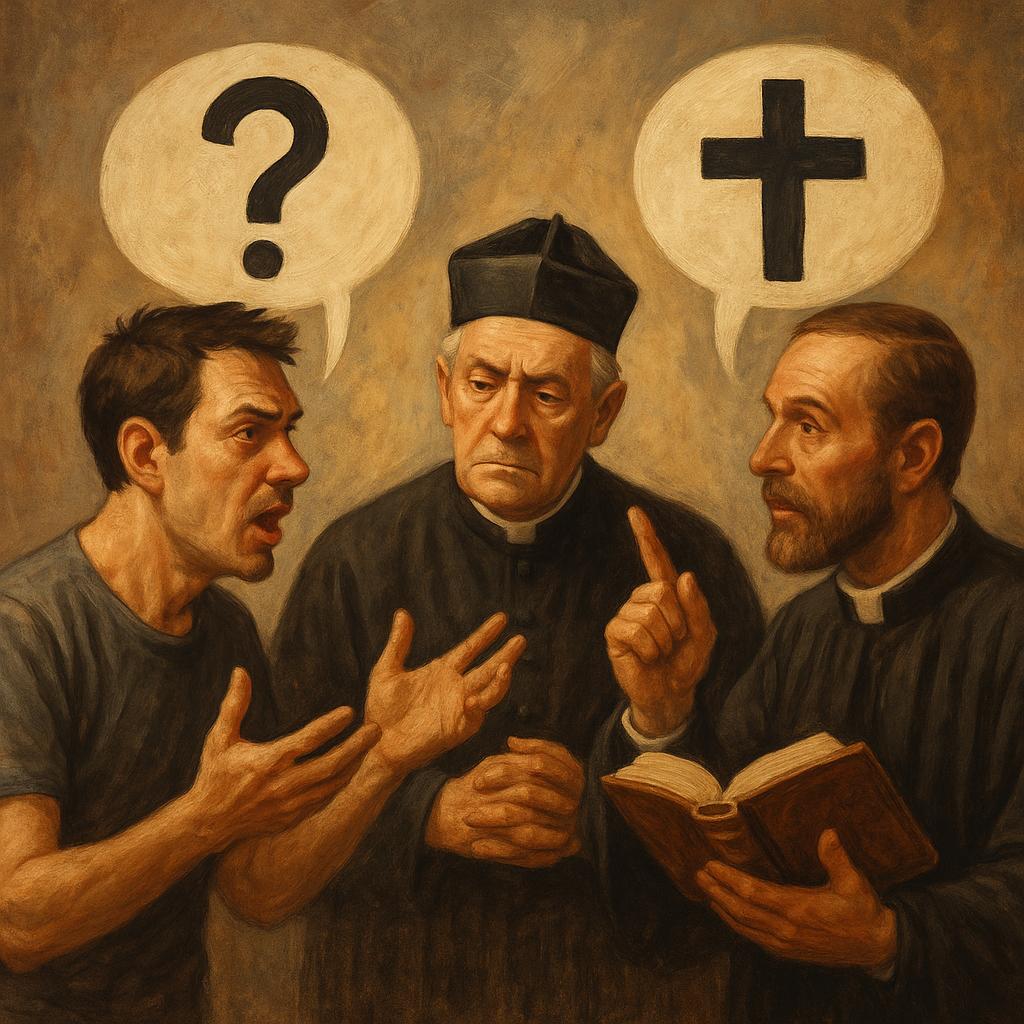I have an opportunity to have talks with one Roman Catholic priest and then two Evangelical ones. Does arguing with them really make sense? I cannot persuade them to stop believing in God, and since I am a rationally inclined person, there is a very slim chance they can persuade me (but it is still there).
But there is one thing for sure. Their style of argument is absolutely different from mine. If I am faced with arguments that are scientifically or logically valid, I just succumb to them. Then going vice versa, they not only do not listen, but they add their religious stuff which makes no sense.
The Bible contradicts itself – you must be spiritual
I was left in awe when one priest said that there are contradictions in the Bible.
However, I possess no emotions, and if I did, I would not have believed in God anyway.
It is not that they are wrong, but how they got there
They got there by bending most arguments—or just basically letting them go. They do not respect Aristotle’s law of non-contradiction. If Car A stops at Point B and Car C is riding through it, it is sealed. But they do not care. If Car A stops at Point B and no Car C is riding through, they do not see it as bending or making a faulty argument.
Then there is confirmation bias. I said that modern science sees human agency as an evolutionary product. So they apply it to God. Nodding followed—and then still nobody cares that I made that argument.
Then there goes the Dunning–Kruger Effect. Of course, they are educated—but in theology, not in sciences such as evolutionary biology or psychology.
So we are animals who had been two billion years waiting for a monotheistic God.
Ad hoc arguments
They argued that the Holocaust had nothing to do with God by reading a logically faulty excerpt from one Holocaust survivor.
Then we have the Appeal to emotion, which is strong. When talking about dismantling atheism, rational arguments go. But when accepting God, you must be spiritual.
I tried to explain that complexity is better explained without God because of preexisting abstract objects, how a God could create himself, or how he cannot be infinite in time (250 Arguments for Atheism, Jan Bryxí, 2025).
They nodded that people may sense agency where there is not any (the mountain is there because God put it there), yet after that, it was like they had never heard the argument.
They were schooled on how to avoid arguments
My grandfather says: “They were schooled in how to bend arguments.” And he is correct. The goal is clear – advocate Christianity and Jesus Christ. The way of getting there – absolutely dubious.
I told them religion was a tool of evolution, either an adaptation or a by-product. Nodding followed. But no lesson was learned.
They do acrobatic pieces in order to save their faith.
I cannot pity them more – Christianity is made-up lies
The figure of Jesus Christ is built on layers of uncertainty. He left no writings. His followers wrote nothing during his life. Instead, his words and actions were passed through oral tradition—filtered by memory, politics, and shifting motives.
By the time the Gospel of Luke was composed—roughly 40 to 60 years after Jesus’ death—it no longer served as simple storytelling. It was theological argument. Luke openly admits he was not an eyewitness. His gospel is a narrative constructed from earlier sources, written to persuade, especially a Roman audience. It reflects a Jesus already shaped by doctrine.
Worse, the four gospels contradict each other. Dates, events, sayings, and character all diverge. One moment Jesus preaches love and humility. The next, he speaks of division and damnation. His image was never fixed. It evolved with each generation that retold it.
Over centuries, this message was polished, narrowed, and institutionalized. Councils chose what to include. Doctrines were imposed. What may have started as a radical teacher’s voice became an imperial slogan—used not to liberate minds but to command obedience.
Jesus might have existed. But the version the world knows is not raw history. It is a product—shaped by scribes, edited by power, and sanctified by those who gained from it.
Why the observation? Follow the patterns, just like an IQ test
I rationally dissect how they were arguing, what counterarguments they gave, and what my own argumentation is.
It is similar to IQ testing. At the end of the day, it does not matter what point you have chosen in an IQ test. It is about how you approach the problem—therefore, how you will adapt and see this world.
It does make sense
One cannot be restrained in one bubble. The different mental patterns and arguments—even if not true—boost your own mental capacity.
And, even if it may sound weird, they can make you a Christian for some time. But you awaken to reality.

Leave a Reply